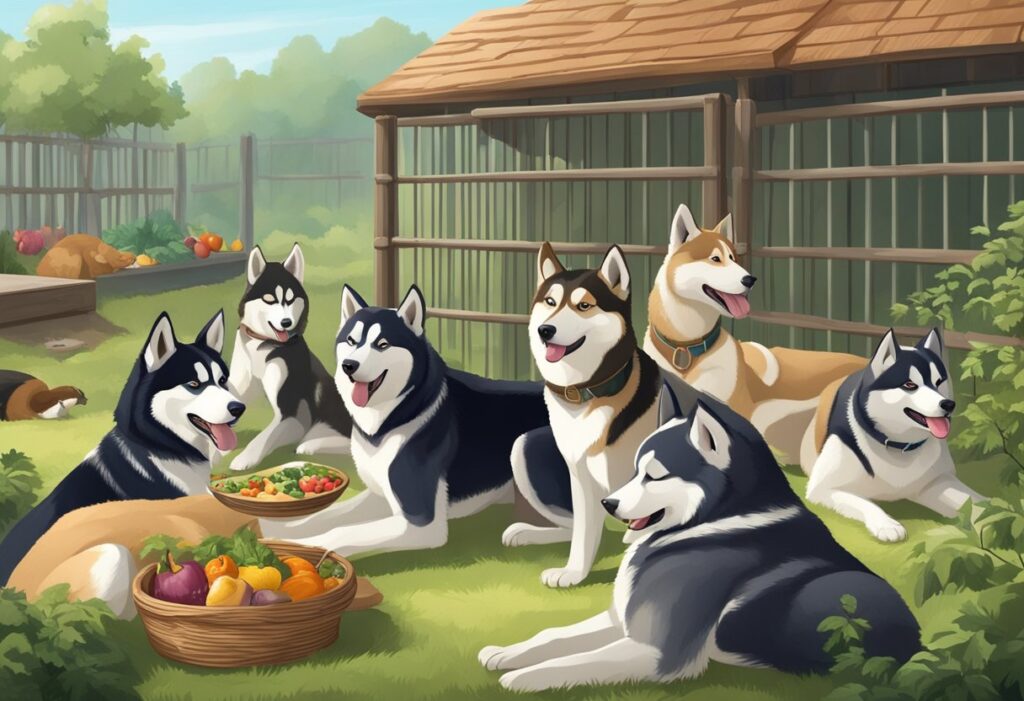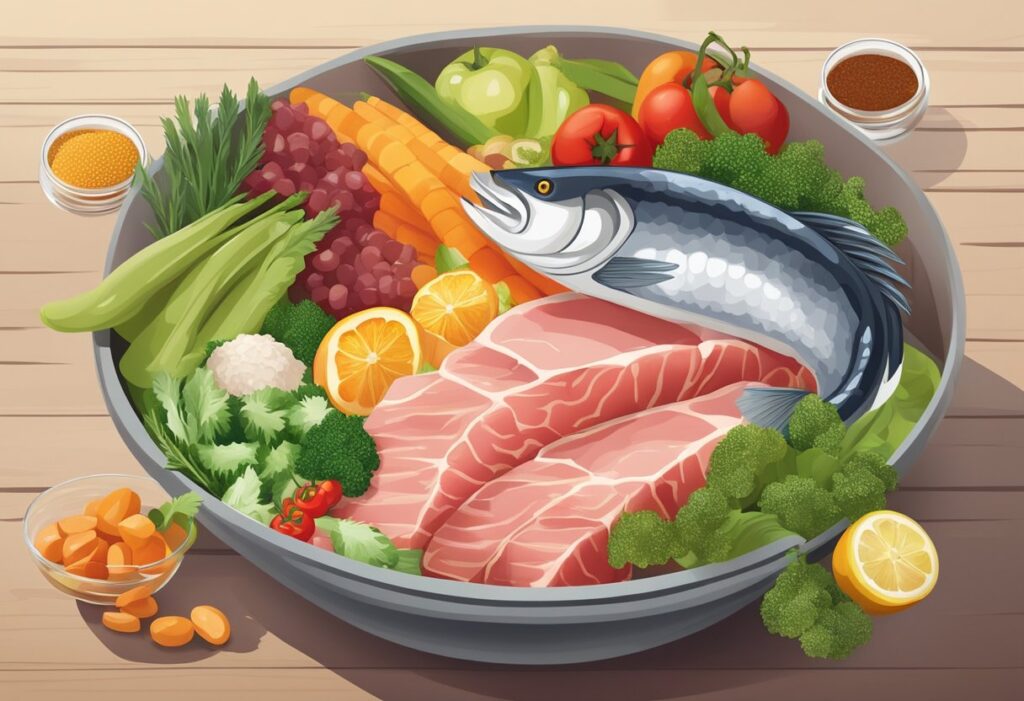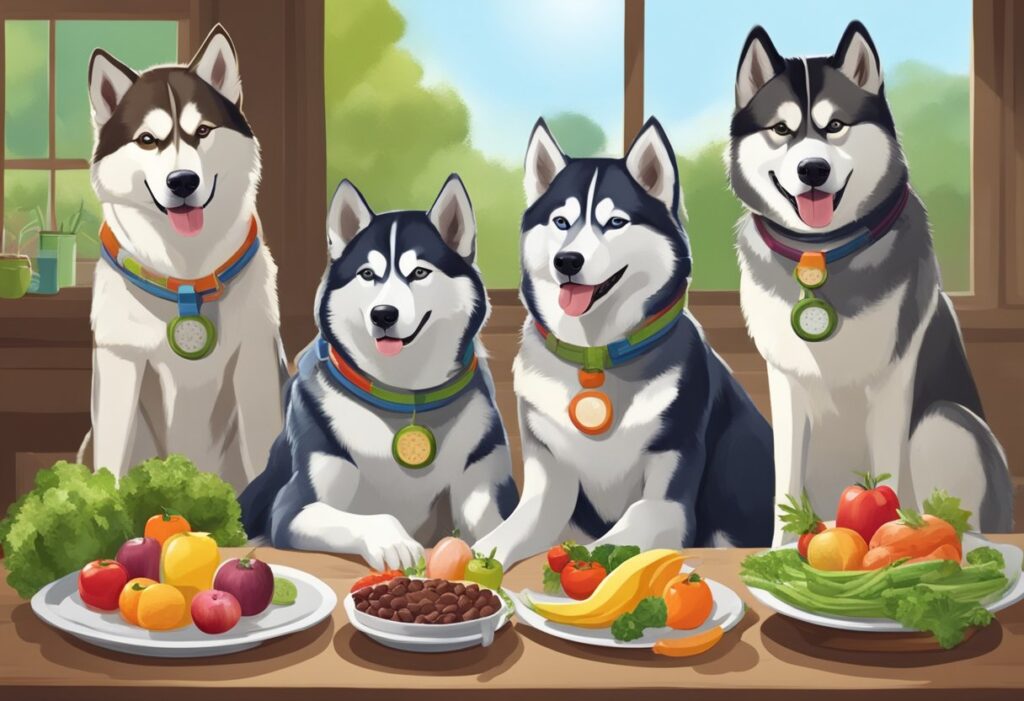Huskies are beautiful, energetic dogs with unique dietary needs. These Arctic breeds need a diet that supports their active lifestyle and keeps them healthy. A balanced diet for huskies should include high-quality protein, healthy fats, and some carbohydrates to fuel their high energy levels.

Feeding a husky the right food in the right amounts is key to their health and happiness. A good diet helps maintain their thick coat, supports muscle development, and keeps them at a healthy weight. It’s important to choose foods that meet their nutritional needs and match their activity level.
Huskies can thrive on different types of diets, including commercial dog foods, raw diets, or home-cooked meals. The best choice depends on your dog’s age, health, and preferences. Talking to a vet can help you pick the right food for your furry friend.
Key Takeaways
- Huskies need a diet high in protein and fat to support their active lifestyle
- Feeding schedules and portion sizes should be adjusted based on the dog’s age and activity level
- Special dietary needs may arise for huskies with health issues or at different life stages
Essential Nutrients for Huskies

Huskies need a balanced diet with specific nutrients to stay healthy and active. These nutrients help them maintain strong muscles, a shiny coat, and good energy levels.
Proteins and Amino Acids
Protein is vital for muscle maintenance in huskies. It helps build and repair tissues, and supports their active lifestyle. Huskies should get high-quality protein from animal sources like chicken, beef, or fish.
Good protein sources for huskies include:
- Lean meats
- Fish
- Eggs
- Dairy products (in small amounts)
Amino acids are the building blocks of proteins. They play key roles in many body functions. Some amino acids are essential, meaning huskies must get them from food.
Fats: Omega-3 and Omega-6
Fats are crucial for huskies. They provide energy and help keep their thick coats healthy and shiny. Omega-3 and omega-6 fatty acids are especially important.
Omega-3 fatty acids help with:
- Reducing inflammation
- Supporting brain function
- Promoting heart health
Omega-6 fatty acids aid in:
- Skin health
- Coat shine
- Immune system function
Good fat sources for huskies include fish oil, flaxseed, and chicken fat. It’s important to balance omega-3 and omega-6 fats in their diet for optimal health.
Carbohydrates and Fiber
Huskies can eat grains and other carbs as part of a balanced diet. Carbs provide energy for their active lifestyle. Fiber aids in digestion and helps keep their gut healthy.
Good carb sources for huskies include:
- Brown rice
- Sweet potatoes
- Oats
- Pumpkin
These foods offer both energy and fiber. Fiber helps huskies feel full and supports regular bowel movements. It’s important not to overdo carbs, as huskies need more protein and fat in their diets.
Vitamins and Minerals
Vitamins and minerals are essential for a husky’s overall health. They support various body functions and help prevent diseases.
Key vitamins and minerals for huskies:
- Vitamin A: For eye health and immune function
- B vitamins: For energy metabolism
- Vitamin E: As an antioxidant
- Calcium: For strong bones and teeth
- Iron: For healthy blood
A variety of vitamins and minerals support their immune system. Huskies can get these nutrients from a mix of meat, fruits, and vegetables in their diet. A balanced commercial dog food often includes all necessary vitamins and minerals.
Feeding Schedule for Huskies
Huskies need a consistent feeding routine that changes as they grow. The amount and timing of meals vary between puppies and adults. Seasonal changes can also affect a husky’s eating habits.
Puppies vs Adults
Husky puppies need more frequent meals than adults. From 2-6 months old, puppies should eat 3 times a day. At 8 months, they can switch to 2 meals daily.
Adult huskies typically eat twice a day. A good rule is to feed them in the morning and evening. This helps keep their energy steady.
Meal sizes change too. Puppies eat smaller portions more often. Adults eat larger meals less frequently. The exact amount depends on the dog’s size and activity level.
Always have fresh water available. This is key for both puppies and adults.
Seasonal Feeding Variations
Huskies may eat differently as seasons change. In colder months, they might need more food. Their bodies burn extra calories to stay warm.
During summer, huskies often eat less. They’re less active in hot weather. Some might skip meals on very warm days.
Adjust portion sizes based on your husky’s activity. Working sled dogs need more food in winter. Pet huskies may not need as big a change.
Watch your husky’s weight and energy. This helps you know if you’re feeding the right amount as seasons shift.
Best Commercial Foods

Huskies need quality commercial foods to meet their nutritional needs. The right food helps maintain their energy, coat health, and overall wellness. Let’s look at some top options.
Dry Kibble
Dry kibble is a popular choice for huskies. It’s easy to store and serve. Look for brands high in protein from real meat sources. Good options have 25-30% protein and 15-20% fat.
Some top picks include:
- Orijen Original
- Taste of the Wild High Prairie
- Blue Buffalo Wilderness
These foods often include fruits and veggies for added nutrients. Avoid brands with lots of fillers or artificial ingredients.
Kibble helps keep teeth clean by scraping away plaque. It’s also good for portion control.
Wet Food
Wet food can be a tasty treat for huskies. It has more moisture, which is good for hydration. Some huskies prefer the texture and smell of wet food.
Top wet food choices include:
- Merrick Grain-Free Wet Dog Food
- Wellness CORE Grain-Free
- Blue Buffalo Wilderness Wet Dog Food
Wet food is often higher in protein than dry kibble. It can be a good option for picky eaters or dogs with dental issues.
Mix wet food with kibble for a balanced diet. This adds variety and makes meals more exciting.
Fresh and Human-Grade Options
Fresh and human-grade foods are becoming more popular. These foods are minimally processed and use high-quality ingredients.
Some good choices are:
- The Farmer’s Dog
- Ollie
- Nom Nom
These foods often contain real meats, veggies, and fruits. They’re made in small batches and frozen or refrigerated.
Fresh foods can be pricier than kibble or wet food. But they offer great nutrition and are very appealing to most dogs.
Some owners mix fresh food with kibble to balance cost and benefits. Always introduce new foods slowly to avoid upset tummies.
Home-Cooked Diets and Raw Feeding
Home-cooked and raw diets offer alternatives to commercial dog food for Huskies. These approaches aim to provide fresh, natural nutrition tailored to a Husky’s needs.
Preparing Balanced Meals
Home-cooked meals for Huskies need careful planning. A balanced diet includes protein, carbs, fats, vitamins, and minerals. Protein is key for muscle maintenance, while fats support energy and coat health.
A typical meal might contain:
- Lean meats (chicken, turkey, beef)
- Vegetables (carrots, green beans)
- Complex carbs (sweet potato, brown rice)
- Healthy fats (fish oil, flaxseed)
It’s vital to consult a vet or canine nutritionist. They can help create a meal plan that meets a Husky’s unique needs. Recipes should be adjusted based on the dog’s age, weight, and activity level.
Understanding Raw Diets
Raw diets for Huskies mimic their ancestral eating habits. This approach often includes raw meat, bones, organs, and some fruits and vegetables. Raw feeding can be natural for Huskies, as they have a history of eating raw food.
Benefits may include:
- Improved dental health
- Shinier coat
- Better digestion
Transition to a raw diet gradually. Start with 25% raw food mixed with regular food. Increase the raw portion over several weeks. This helps prevent stomach upset.
Safety is crucial. Use fresh, high-quality ingredients. Clean all surfaces and bowls thoroughly to avoid bacteria growth. Always talk to a vet before starting a raw diet.
Special Dietary Considerations

Huskies may have unique dietary needs that require extra attention. Some huskies are prone to food allergies or sensitivities. Others need help maintaining a healthy weight.
Allergies and Sensitivities
Huskies can be sensitive to certain foods. Common allergens include beef, chicken, dairy, and grains. Signs of food allergies in huskies may include:
• Itchy skin
• Ear infections
• Digestive issues
• Paw licking
If a husky shows these symptoms, it’s best to try an elimination diet. This means removing common allergens from their food. Owners can slowly add ingredients back one at a time. This helps identify the specific trigger.
Some huskies do well on grain-free diets. Others may need novel protein sources like duck or salmon. Working with a vet can help find the right diet for a sensitive husky.
Weight Management
Huskies are active dogs, but they can gain weight if overfed. Regular weight checks are important. Owners should be able to feel their husky’s ribs without seeing them.
Tips for managing a husky’s weight:
• Measure food portions carefully
• Limit treats to 10% of daily calories
• Increase exercise if needed
• Choose lower-calorie foods for less active huskies
Overweight huskies may need a diet higher in protein and lower in fat. This helps them feel full while eating fewer calories. For underweight huskies, adding healthy fats can help them gain weight safely.
Active huskies need more calories than less active ones. Adjusting food amounts based on activity level helps maintain a healthy weight.


Leave a Reply